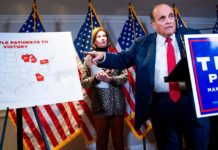Duque said he was pushed to send the military in order to lift dozens of protester roadblocks that since early May have brought the country to a standstill — but critics and some analysts see the deployment as a risky bet destined to add fuel to the fire.
Soldiers facing protesters
“Having more security forces on the streets is not a step in the direction of peace,” said Sebastian Lanz of Temblores, a Colombian NGO specialized in documenting police violence. His organization has identified over 3400 cases of police abuse in dealing with the protesters, he says.
Lanz says dialogue and peaceful resolution of conflicts should be prioritized as a means of de-escalating the situation while respecting civilians’ right to protest. “We ask ourselves, is this deployment of soldiers really intended to pacify the city, or is it to intimidate and limit the rights of the protesters?” he said.
Colombia’s government disputes Temblores’ figures, but it’s hard to deny the heavy-handedness employed by some Colombian security forces. On Monday, Police Inspector General Jorge Luis Ramirez said his office is investigating 170 cases of abuse at the hands of the police. Eleven of those cases are directly linked to the assassination of protesters at the hands of policemen.
Adding active soldiers to the mix could increase the risk of lethal encounters at otherwise peaceful protests, warns Juan Carlos Ruiz, a professor of political science at Bogota’s Universidad del Rosario.
“Having the military handle a protest rally is not the best idea,” he told CNN. “Even the anti-riot police, with all the issues and incidents they have been involved so far in the protest, at least they are a body of trained professionals specialized in dealing with protesters. A soldier is not trained in conflict resolution: they are trained to kill.”
At the same time, Ruiz says the government’s decision to add military muscle seemed “inevitable,” given the damage the roadblocks cause to a Colombian economy already battered by the Covid-19 pandemic.
The negotiations, still ongoing, have so far failed to provide concrete results and tension continues to grow.
The view from Washington
“Secretary (of State) Blinken has the power to stop the fear and terror that Colombian protesters are enduring, and he must do so immediately,” said Philippe Nassif, the advocacy director at Amnesty International USA, in joining calls for an immediate suspension of weapons-related assistance to the Colombian police.
CNN has requested comment from the US State Department.
Long-lasting consequences
In issuing the decree on Friday that authorized military assistance to police facing protesters, Duque stressed it was a temporary decision. Soldiers would be withdrawn as soon as the situation returned to calm, he said.
But Lanz of the NGO Temblores, warns the consequences of this decision could last much longer. “What we’re seeing here is that the security forces are reclaiming the territorial control of the public space,” he said.
“Because of Covid-19 and the lockdowns, we lost the right to a shared public space where everyone could be free. On one side you have protesters who are reclaiming that space for themselves, but on the other the government is sending the Army to fight for control. It’s a territorial fight, and it won’t end soon,” he added.
Source : Nbcnewyork














